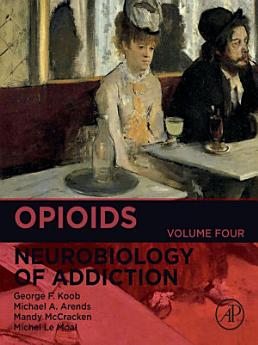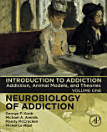Opioids
may 2023 · Neurobiology of Addiction Series Libro 4 · Academic Press
Libro electrónico
424
Páginas
family_home
Apto
info
reportLas calificaciones y opiniones no están verificadas. Más información
Acerca de este libro electrónico
A current survey and synthesis of the most important findings in our understanding of the neurobiological mechanisms of addiction is detailed in our Neurobiology of Addiction series, each volume addressing a specific area of addiction. Opioids, Volume 4 in the series, explores the molecular, cellular and systems in the brain responsible for opioid addiction using the heuristic three-stage cycle framework of binge/intoxication, withdrawal/negative affect, and preoccupation/anticipation. - Highlights recent advances in opioid addiction - Includes Neurocircuitry, Cellular and Molecular neurobiological mechanisms of opioid addiction - Defines opioid abuse and addiction potential, including biological tolerance
Acerca del autor
Dr. Koob is an internationally-recognized expert on alcohol and stress, and the neurobiology of alcohol and drug addiction. He is the Director of the National Institute on Alcohol Abuse and Alcoholism (NIAAA), overseeing a broad portfolio of alcohol research ranging from basic science to epidemiology, diagnostics, prevention, and treatment. Dr. Koob earned his doctorate in Behavioral Physiology from Johns Hopkins University in 1972. Prior to taking the helm at NIAAA, he served as Professor and Chair of the Scripps' Committee on the Neurobiology of Addictive Disorders and Director of the Alcohol Research Center at the Scripps Research Institute. Early in his career, Dr. Koob conducted research in the Department of Neurophysiology at the Walter Reed Army Institute of Research and in the Arthur Vining Davis Center for Behavioral Neurobiology at the Salk Institute for Biological Studies. He was a post-doctoral fellow in the Department of Experimental Psychology and the MRC Neuropharmacology Unit at the University of Cambridge. Dr. Koob began his career investigating the neurobiology of emotion, particularly how the brain processes reward and stress. He subsequently applied basic research on emotions, including on the anatomical and neurochemical underpinnings of emotional function, to alcohol and drug addiction, significantly broadening knowledge of the adaptations within reward and stress neurocircuits that lead to addiction. Dr. Koob has authored more than 650 peer-reviewed scientific papers and is a co-author of The Neurobiology of Addiction.Michael A. Arends received his Bachelor of Science degree from the University of California, San Diego. He is currently a Senior Research Assistant in the Committee on the Neurobiology of Addictive Disorders at The Scripps Research Institute and has worked in the field of the neurobiology of drug addiction for 20 years. He is Managing Editor for the journals Pharmacology Biochemistry and Behavior and Journal of Addiction Medicine. He has been acknowledged for his editorial and research assistance in over 450 scientific publications, including books, book chapters, and journal articles.Dr. McCracken is a senior post-doctoral fellow at the National Institute on Drug Abuse in Bethesda, Maryland. She graduated with Honors in Biology and Psychology from The University of Texas at Austin and then earned a Ph. D. in Pharmacology and Toxicology at the College of Pharmacy at The University of Texas at Austin. Her research interests focus on molecular neurobiological mechanisms involved in neuroadaptations to drugs of abuse including opioids and alcohol. She has identified key sites on GABA-A receptors and glycine receptors important for the neuronal actions of alcohol. She has extensive experience in teaching as an Assistant Instructor with Dr. R. Adron Harris for the course Neurobiology of Addiction at The University of Texas at Austin.
Califica este libro electrónico
Cuéntanos lo que piensas.
Información de lectura
Smartphones y tablets
Instala la app de Google Play Libros para Android y iPad/iPhone. Como se sincroniza de manera automática con tu cuenta, te permite leer en línea o sin conexión en cualquier lugar.
Laptops y computadoras
Para escuchar audiolibros adquiridos en Google Play, usa el navegador web de tu computadora.
Lectores electrónicos y otros dispositivos
Para leer en dispositivos de tinta electrónica, como los lectores de libros electrónicos Kobo, deberás descargar un archivo y transferirlo a tu dispositivo. Sigue las instrucciones detalladas que aparecen en el Centro de ayuda para transferir los archivos a lectores de libros electrónicos compatibles.







